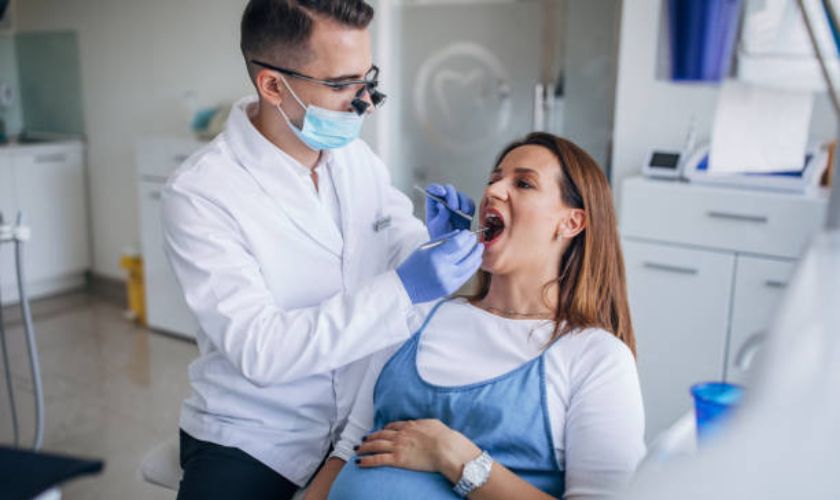
A Few Common Questions About Dental Care During Pregnancy
Routine dental care at the dentist is safe for most pregnant women. The idea that going to the dentist while pregnant is dangerous for both the baby and the mother-to-be is an old wives’ tale. Everyone needs to take care of their teeth to live a healthy life.
Few Common Questions About Dental Care During Pregnancy
Here are a few common questions you need to know about dental care during pregnancy:
Why Is It Important To Take Care Of Your Teeth While Pregnant?
Some medications and hormone changes can make dry mouth and gum disease more likely, so we tell pregnant patients to brush and floss twice daily. That might sound like a lot, but it can keep your teeth from getting cavities when you eat sweets you crave. Also, severe morning sickness can make you vomit a lot, which can wear down your teeth. Sometimes, pregnancy hormones can cause harmless growths in the mouth that aren’t dangerous but can be annoying.
Also, a baby’s teeth start between the third and sixth months of pregnancy. Pregnant women should watch what they eat to ensure their babies have healthy teeth. A strong gag reflex could make it hard for pregnant women to brush their teeth. To make brushing more accessible, a person can use a smaller toothbrush or try different toothpaste flavors.
I’m In The Middle Of The Second Trimester Of My Pregnancy. Can Someone Clean My Teeth?
It is safe to treat during each trimester. But getting dental work done during the second trimester is the safest time. The third trimester is safe, but it might be hard for the patient to lie back for a long time.
Most common dental treatments do not have to be put off until after pregnancy unless there is a medical reason. Some experts think there might be a link between periodontal disease and pregnancy, like giving birth early or getting preeclampsia. Some doctors will tell pregnant women not to visit the dentist until after the first trimester. This is to lower the chance that the baby will die. We don’t think getting dental care increases the chance of a miscarriage, and we don’t recommend putting off needed care.
If a patient needs major dental work or wants to get braces, they might want to wait until after they give birth. This is what we usually tell people to do before most medical procedures. If you need the procedure for your health, go ahead and get it done. If you don’t have to do something or if it can wait, that’s usually the safest choice.
What Anesthetics Are Safe If I Need Oral Surgery Or A Procedure?
Local anesthetics like bupivacaine, lidocaine, and mepivacaine are safe to use during pregnancy. Talk to your certified nurse midwife ahead of time if your dentist thinks you need something more substantial.
Are Dental X-rays Safe During Pregnancy?
With digital radiography, worries about radiation are almost gone. X-rays used to diagnose dental disease during pregnancy don’t pose much risk to the growing baby. This is especially true when you think about how infections and pain can happen if you don’t get X-rays. But it would be best to tell your dentist that you are pregnant before you get an X-ray so that the staff can give you a particular garment or device to protect your pelvis and abdomen.
It’s a myth that going to the dentist will make you sick.
What Antibiotics Can I Take To Prevent A Tooth Infection Or Treat One If I Already Have One?
Penicillin, amoxicillin, and cephalosporins like cephalexin are safe to take while pregnant. Avoid tetracycline because it can make a baby’s teeth look yellow.
What Can I Take To Ease The Pain After Going To The Dentist?
Acetaminophen is often prescribed with a narcotic drug like codeine or hydrocodone, and it is safe to take while pregnant. To lower the risk of becoming addicted to opioids, we tell patients to use these drugs for as short as possible after surgery. Patients should be told to switch to non-narcotic painkillers like plain acetaminophen as soon as possible. Because of this, dentists shouldn’t give any opioid drugs for 30 days. Nonsteroidal anti-inflammatory drugs (NSAIDs), like ibuprofen, should not be taken by a pregnant woman.
What About Dental Care For The Baby After They Are Born?
It’s imperative to keep caring for your and your baby’s teeth after giving birth. Keep brushing your teeth every day, and buy a baby toothbrush and fluoride-free toothpaste for the baby to keep the gums and new teeth healthy. We also tell people who just had a baby not to put them to bed with a bottle because that can cause tooth decay.
Your baby should go to the dentist for the first time at six months or when the first tooth comes in, whichever comes first. The dentist will check for tongue-tie and other problems in the mouth that can make it hard to talk or do other things. Also, going to the dentist often will help the baby get used to it and might make them less afraid of going to the dentist as an adult. Remember that having healthy teeth is essential for your overall health and that pregnancy is a great time to start new healthy habits. You can visit our dental clinic for the best general dental checkup for your family.
